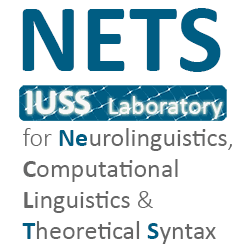
The laboratory investigates natural languages through both the development and evaluation of formal models, and the use of behavioral experimentation techniques and the analysis of psycho- and neurolinguistic data. Key areas of experimental investigation include: sentence processing and specific syntactic structures, assessment of linguistic complexity, semantic and inferential processing, language acquisition, and language disorders.
Research activities are conducted both in person (e.g., eyetracking and behavioral studies) and via “smart-lab” modes, using an online experimental platform specifically developed for the lab. The laboratory also manages the collection of both natural linguistic data (corpora) and elicited data (via targeted tests), often in collaboration with other institutions, both within and outside of IUSS, for example in studying linguistic processing in atypical populations (such as individuals with deafness or aphasia). The lab hosts students and PhD candidates engaged in language-related research projects.
Research activities also benefit from access to the SIFÀ-IUSS Lab (Supercomputer for an Inclusive Future At IUSS), where a platform has been developed for training Language Models (LMs), enabling the development of both small and large-scale models using machine learning techniques (e.g., projects such as BabyLM and T-GRA2L).
The laboratory's research aligns fully with several core thematic areas defined in the IUSS Identity and Development Plan. The primary alignment is with the area [Mind – Body – Languages], both in terms of theoretical models describing various human linguistic components (primarily morphology, syntax, and semantics) and in relation to their implications in psycho- and neurolinguistics. The theme [Complexity – Thought – Explanation] is also central, particularly with respect to both the formal grammatical models and the computational models developed in the lab, with a focus on their predictive capabilities regarding complexity and perceived or observed difficulty, as measured in behavioral studies. Thanks to PNRR-funded PhD scholarships with a “green” focus, the lab has also launched projects on linguistic usage and environmental sustainability, falling under the theme [Climate – Sustainability – Risk].
Finally, the theme [Space – Future – Data] is also relevant to the lab’s work, particularly in relation to big data usage and the development of Language Models. The laboratory is a member of the Italian Reproducibility Network (IRTN).
RESEARCH IN PSYCHOLINGUISTICS AND NEUROLINGUISTICS
Research topics include:
- Neurobiological foundations of morphosyntax and lexical/compositional semantics
- Neurophysiological correlates of various linguistic constraints (e.g., c-command, feature-based intervention)
- Computational models of impaired processing (Primary Progressive Aphasia, Alzheimer’s disease, etc.)
RESEARCH IN THEORETICAL SYNTAX
Research topics include:
- Movement theory (long-distance dependencies, strong and weak syntactic islands, intervention)
- Sentence structure (expletives, copular clauses, reduced structures, interrogative and relative clauses)
- Syntax-semantics interface (focus, vocatives, definiteness effects)
- Directionality (top-down, left-to-right) and incrementality in phrase structure building
RESEARCH IN COMPUTATIONAL LINGUISTICS
Research topics include:
- Recursion and complexity
- Formal models of processing and generation of linguistic structures
- Estimation of psycholinguistic effort through complexity metrics
- Gradience and categoricality in grammatical perception
Ongoing projects:
- T-GRA2L - Testing GRAdeness and GRAmmaticality in Linguistics (PRIN 2022, Italian Ministry of University and Research MUR, funded by the European Union – NextGenerationEU – 202223PL4N – CUP I53D23003900006)
- SYN-CROSS - Syntactic Flexibility in Developmental Language Disorder. A Cross-Linguistic Study (Marie Skłodowska-Curie Fellowship, European Union funding program, HORIZON-MSCA-2024-PF-01, Grant Agreement n. 101207792)
Head: Prof. Cristiano Chesi
Research staff:
Prof. Andrea Moro
Prof. Matteo Paolo Greco
Prof.ssa Eleonora Catricalà
Dott.ssa Hanna Cygan
Dott.ssa Anna Teresa Porrini
Dott.ssa Sarah Rossi
Dott.ssa Sofia Neri
Dott. Tommaso Sgrizzi
Dott. Luca Andreoli
Dott.ssa Albina Mukusheva
National collaborations
DISPOC UNISI
CIMEC UNITN
International collaborations
École Normale Supérieure
Institut Jean Nicod
Collège de France
Queen Mary University of London (Department of Linguistics)
Max Planck Institute, CBS
- Barbini, M., Bianchessi, M. L. P., Bressan, V., Fusco, A., Neri, S., Rossi, S., ... & Chesi, C. (2025). BLiMP-IT: Harnessing Automatic Minimal Pair Generation for Italian Language Model Evaluation. In CLIC-IT 2025 Proceedings. CEUR.
- Chesi, C. (2025). A conclusive remark on linguistic theorizing and language modeling. Italian Journal of Linguistics. 37(1):185-200. DOI: 10.26346/1120-2726-249, .
- Chesi, C., Bressan, V., Barbini, M., Fusco, A., Bianchessi, M. L. P., Neri, S., ... & Sgrizzi, T. (2024). Different Ways to Forget: Linguistic Gates in Recurrent Neural Networks. In The 2nd BabyLM Challenge at the 28th Conference on Computational Natural Language Learning (pp. 106-117).
- Fusco, A., Piccini Bianchessi, M. L., Sgrizzi, T., Zanollo, A., Chesi, C. (2025) Linguistic Units as Tokens: Intrinsic and Extrinsic Evaluation with BabyLM. In The 3nd BabyLM Challenge at EMNLP 2025 (pp. 106-117).
- Rossi, S., Formichi, G., Neri, S., Sgrizzi, T., Zanollo, A., Bressan, V., & Chesi, C. (2025). Acquisition in Babies and Machines: Comparing the Learning Trajectories of LMs in Terms of Syntactic Structures (ATTracTSS Test Set). In CLIC-IT 2025 Proceedings. CEUR.
The full list of publications is available on the following page of the IRIS archive.
For further information, please contact the following email address: nets@iusspavia.it